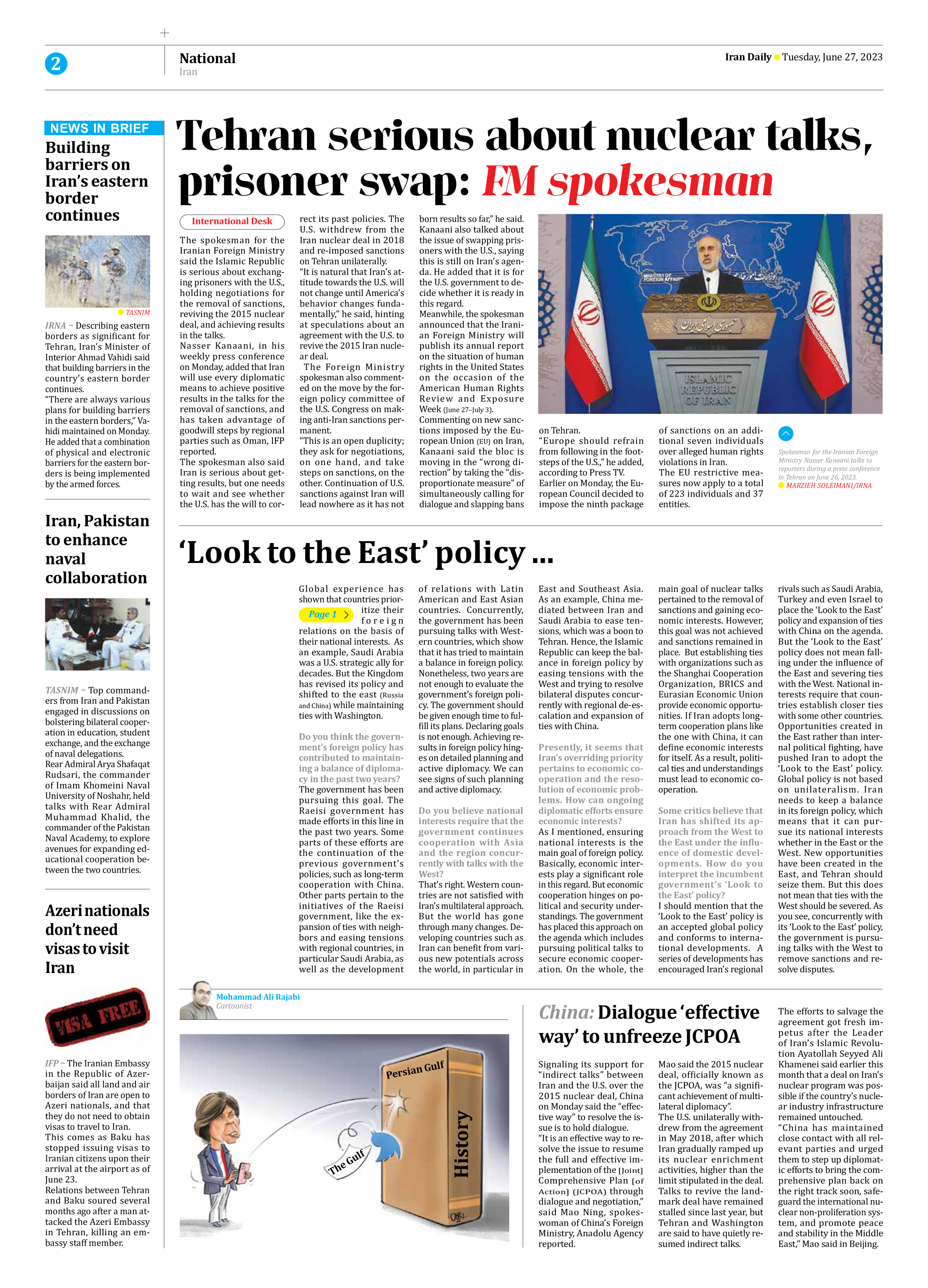
‘Look to the East’ policy ...
Page 1
Global experience has shown that countries prioritize their foreign relations on the basis of their national interests. As an example, Saudi Arabia was a U.S. strategic ally for decades. But the Kingdom has revised its policy and shifted to the east (Russia and China) while maintaining ties with Washington.
Do you think the government’s foreign policy has contributed to maintaining a balance of diplomacy in the past two years?
The government has been pursuing this goal. The Raeisi government has made efforts in this line in the past two years. Some parts of these efforts are the continuation of the previous government’s policies, such as long-term cooperation with China. Other parts pertain to the initiatives of the Raeisi government, like the expansion of ties with neighbors and easing tensions with regional countries, in particular Saudi Arabia, as well as the development of relations with Latin American and East Asian countries. Concurrently, the government has been pursuing talks with Western countries, which show that it has tried to maintain a balance in foreign policy. Nonetheless, two years are not enough to evaluate the government’s foreign policy. The government should be given enough time to fulfill its plans. Declaring goals is not enough. Achieving results in foreign policy hinges on detailed planning and active diplomacy. We can see signs of such planning and active diplomacy.
Do you believe national interests require that the government continues cooperation with Asia and the region concurrently with talks with the West?
That’s right. Western countries are not satisfied with Iran’s multilateral approach. But the world has gone through many changes. Developing countries such as Iran can benefit from various new potentials across the world, in particular in East and Southeast Asia. As an example, China mediated between Iran and Saudi Arabia to ease tensions, which was a boon to Tehran. Hence, the Islamic Republic can keep the balance in foreign policy by easing tensions with the West and trying to resolve bilateral disputes concurrently with regional de-escalation and expansion of ties with China.
Presently, it seems that Iran’s overriding priority pertains to economic cooperation and the resolution of economic problems. How can ongoing diplomatic efforts ensure economic interests?
As I mentioned, ensuring national interests is the main goal of foreign policy. Basically, economic interests play a significant role in this regard. But economic cooperation hinges on political and security understandings. The government has placed this approach on the agenda which includes pursuing political talks to secure economic cooperation. On the whole, the main goal of nuclear talks pertained to the removal of sanctions and gaining economic interests. However, this goal was not achieved and sanctions remained in place. But establishing ties with organizations such as the Shanghai Cooperation Organization, BRICS and Eurasian Economic Union provide economic opportunities. If Iran adopts long-term cooperation plans like the one with China, it can define economic interests for itself. As a result, political ties and understandings must lead to economic cooperation.
Some critics believe that Iran has shifted its approach from the West to the East under the influence of domestic developments. How do you interpret the incumbent government’s ‘Look to the East’ policy?
I should mention that the ‘Look to the East’ policy is an accepted global policy and conforms to international developments. A series of developments has encouraged Iran’s regional rivals such as Saudi Arabia, Turkey and even Israel to place the ‘Look to the East’ policy and expansion of ties with China on the agenda. But the ‘Look to the East’ policy does not mean falling under the influence of the East and severing ties with the West. National interests require that countries establish closer ties with some other countries. Opportunities created in the East rather than internal political fighting, have pushed Iran to adopt the ‘Look to the East’ policy. Global policy is not based on unilateralism. Iran needs to keep a balance in its foreign policy, which means that it can pursue its national interests whether in the East or the West. New opportunities have been created in the East, and Tehran should seize them. But this does not mean that ties with the West should be severed. As you see, concurrently with its ‘Look to the East’ policy, the government is pursuing talks with the West to remove sanctions and resolve disputes.







